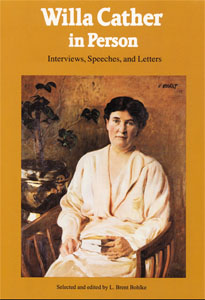from Willa Cather in Person: Interviews, Speeches, and Letters
Selected and edited by L. Brent Bohlke
Lincoln & London: University of Nebraska Press, 1986
1903: NEW YORK
The publication of April Twilights gave Willa Cather national notice for the first time. The book was reviewed by the New York Times, the Critic, the Dial, the Boston Evening Transcript, the Bookman, and other nationally known publications. One of the more laudatory reviews, "Glimpses of Present Day Poets," appeared in Poet-lore. It included a photo of the author and reprinted in full the three poems said to be her favorites. Bernice Slote has pointed out that publicity was probably involved somewhere in the review since Badger Books, publishers of April Twilights, were printed by Gorham Press, the publisher of Poet-lore. Slote says that "because Willa Cather was certainly consulted about the article, it does have some valuable information on the poems" and Cather's opinions of them (AT 1903, pp. xix, 54). The review also gives us the first picture of Cather as a child running "wild" with "the little herd girls" and may be the first time that 1876 was given as her birthdate (she was born in 1873). Cather's early reading list was confirmed by Edith Lewis fifty years later (Willa Cather Living, p. 14).
GLIMPSES OF PRESENT-DAY POETS: WILLA SIBERT CATHER
Miss Willa Sibert Cather, whose delightful volume of poems, entitled April Twilights, was recently published, was born near Winchester, Virginia, in 1876. When she was ten years old, the family moved to a ranch in Southwestern Nebraska, and for two years the child ran wild playing with the little herd girls and visiting the Danes and Norwegians, who had settled there as farmers.
During the ranch period and for some time after, Miss Cather did not go to school at all, and her only reading was an old copy of Ben Johnson's plays, a Shakespeare, a Byron, and The Pilgrim's Progress, which latter she said she read through eight times in one winter. The first two years of her course at the University of Nebraska, where she graduated in 1895, were spent in the hardest kind of study, but then she discovered herself and began to write a little. She edited a creditable college magazine, and did remarkably discriminating dramatic criticism for the Nebraska State Journal. Later she wrote for the Lincoln Courier, and in 1896, she came to Pittsburg, where she was for several years on the staff of the Leader, doing clever dramatic and literary criticism in addition to her regular work.
Miss Cather's first story, "Eric Hermanson's Soul,"* a study of the effect of western climatic conditions on the Scandanavian temperament, was translated into German and republished by The Dresden Critic, Eugene Von Sempskey.
All of the verse published in Miss Cather's volume, April Twilights, has been done within the last five years. Her early effort was all toward prose, her verse always being incidental and usually accidental. "Grandmither Think not I Forget," the best poem of the collection, was never retouched after the first writing.
Miss Cather has contributed prose and verse to various American periodicals. Her latest story, "A Death in the Desert," published in Scribners, shows that her feeling for western atmosphere has in no-wise diminished. She has also completed a series of short stories, all of which are studies of artist life.
The following poems are Miss Cather's favorites: "Grandmither, Think not I Forget," "Mills of Montmartre," and "The Hawthorn Tree."
*Appears as such in text, actual story title is "Eric Hermannson's Soul."
Poet-lore, Winter 1903.
